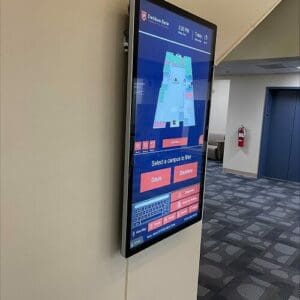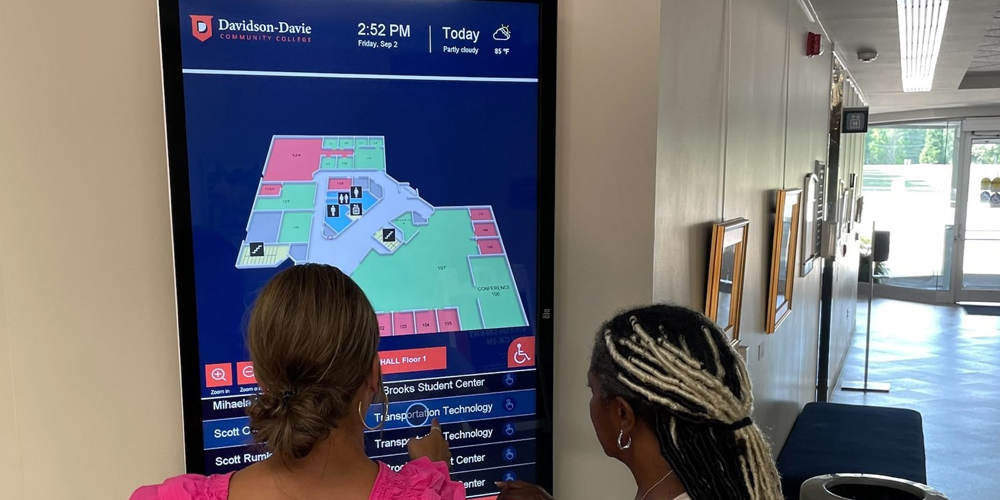THOMASVILLE, N.C. — Davidson-Davie Community College is evolving just as quickly as the world around it. The community college hosts nearly 4,000 students on its 97-acre campus with 11 separate buildings and two emergency services training facilities.
The school offers a wide range of curriculum programs for students at many different life stages: from full-time college transfer programs to healthcare apprenticeships to short-term continuing education programs. Six in ten students attend part-time, and one third are enrolled in a mix of online and onsite courses. As a result, students and visitors arrive on campus for the first time every day.
RELATED ARTICLE: Leveraging Digital Signage Infrastructure for Campus Emergency Mass Notifications
College Wanted to Make It Easier for Students, Visitors to Navigate the Campus
The community college needed a fresh way to welcome people to campus, show them what the school has to offer, and help them find their way around a complex facility with both indoor and outdoor spaces. They also wanted a solution that could keep pace with changes at the college and would immediately demonstrate to prospective students that Davidson-Davie is a modern institution that can help them prepare for the working world.
The IT team at Davidson-Davie set out to make it easier for students and visitors to navigate the campus. They needed a solution that could grow with them, adapting to needs they hadn’t yet identified. The ideal result would not only make campus more accessible, but contribute to a vibrant campus life and be easy to manage and update for years to come.
The Solution: Interactive Digital Signage
The Davison-Davie College IT team decided upon a network of interactive digital signage to refresh their growing facility. They installed 19 touchscreens in high-traffic areas spanning multiple buildings in two primary campus locations. All screens are networked and connected to a single unified back-end, the 22Miles Publisher Pro CMS. Any updates or changes can be pushed out instantly to screens in every location, keeping the interactive 3D-maps, step-by-step directions, and preferred/accessible routing constantly up to date.

All screens are networked and connected to a single unified back-end. Any updates or changes can be pushed out instantly to screens at all 19 locations on campus, keeping the interactive 3D-maps, step-by-step directions, and preferred/accessible routing constantly up to date.
“Students really like – and I think are sometimes surprised by – how easy it is to go in and pick a room through the touch interface on the map,” says Director of IT Services Donald Beck.
Users can also access a faculty directory, view the college’s event schedule, or locate college services. Whatever they’re looking for, the sign furnishes detailed turn-by-turn directions, guiding them from floor-to-floor or building-to-building using a 3D map of the campus.
In a facility of this scale, however, giving people directions on the sign itself isn’t enough. People in a hurry shouldn’t be forced to memorize or write down a complex route. Instead, visitors to the Davidson-Davie campus can scan a QR code to transfer their personalized directions to their mobile device via the college’s 22Miles mobile web app. There’s nothing to download; the scan takes users to a simple URL with a web-based version of the 3D wayfinding system.
Davidson-Davie’s new digital signage network is more than a wayfinding system. It’s also a key communications channel for the college’s marketing team: “The first screen that people see has advertisements,” says Jamie Bowman, director of multimedia strategy. “Different things happening on campus, upcoming events: things that students need to know about…Then, once a student touches to interact, it switches over to the wayfinding.”
Davidson-Davie’s wayfinding layout also features live social feeds, news, and campus events. The system is set up to encourage engagement with campus life.
Minimal Barriers to Entry
Davidson-Davie’s unified digital signage system has led to some unexpected benefits. Once the IT team deployed the 22Miles system, they found that they could easily hand the reins over to other departments to manage their own areas of expertise.
“The interface is very easy,” says Bowman. “I’ve taught other people how to use the back-end, and really, with just five minutes of training, they’re up and going and able to input content themselves.”
“The folks that know marketing can do the marketing part,” adds Beck. “Updating the directories and things of that nature is something that [the IT team] can easily do through the web interface.”
RELATED ARTICLE: Comments from 2024 Campus Safety Emergency Notification Survey Participants
When a system is used to meet multiple objectives – like Davidson-Davie’s – these low barriers to entry are crucial. With proper administrative controls and approval hierarchies, everyone can manage the content they know best directly in the back-end: no middleman required. When multiple stakeholders are empowered to contribute to the onscreen experience, sign content stays up-to-date and compelling.
The flexibility of their platform also gives the Davidson-Davie team ample room to expand and evolve the solution in the future. They will be able to use the same unified back-end to power room signage, space management and room booking services, digital menu boards for the Storm Cellar dining hall, a campus mobile app or even videowalls.
System Can Handle Needs Now and Into the Future
Davidson-Davie’s new digital signage system makes the growing campus more accessible and welcoming. The solution allows students to find whatever they need, whether it’s a room, a faculty member, a new passion, or a community. By combining digital signage messaging, campus information, and wayfinding on a single interactive system, the Davidson-Davies’ team have created a solution that offers value to first-time visitors and daily users alike.
The touchscreen interactivity is intuitive and draws users in, while the integrated mobile web app ensures they have all the information they need on the go. The simple, unified back-end makes it easy for any team member to update and maintain the content they own. And, with a flexible CMS that can handle any visual communications application, they’re ready for the next stage of growth, whatever the future holds.
This article originally appeared in CS sister publication MyTechDecisions.com and has been edited.







